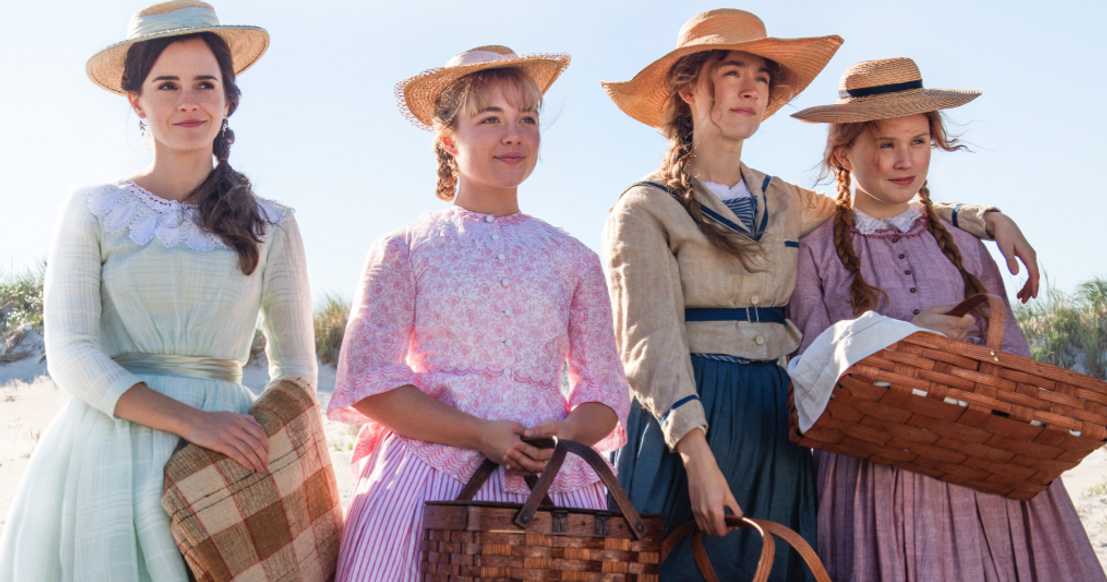The literary women of the 1860s are having a moment on the big (or small) screen. With a new film adaptation of Louisa May Alcott’s classic, Little Women by Ladybird director Greta Gerwig, and an AppleTV comedy series, focusing on the most notable American, nineteenth-century female poet- Emily Dickinson. These two very new and different adaptations are raising questions as to how much liberty and artistic freedoms should be ascribed to scriptwriters and directors when handling texts or lives that hold such literary significance.
With the release of these two, female-centric trailers the question has been brought to a head. Gerwig’s Little Women feels nostalgic of the 1860s, it doesn’t feel bogged down by their misogynistic societal apprehensions, but still conforming to its sources’ historical setting, as there are horses, and hoop dresses galore, instead, it feels as light and liberated, as Saoirse Ronan’s Jo runs through a forest. Perhaps the more feminist vibe emanating from it, justifies it being remade for the eighth time. The film is brimming with sisterly affection, that it inspires comparison between the sisterhood that seems to be developing between women, in the wake of the Times Up movement, adding a further layer to Alcott’s ideas on sisterly love.
However, some liberties are taken as whilst some lines are directly from the book, the standout part of the trailer is an impassioned declaration by, Jo that “women have minds and they have souls as well as just hearts. They’ve got ambition and they’ve got talent as well as just beauty. I am so sick of people saying that love is just all a woman is fit for. I’m so sick of it!” Instead, the words come directly from one of Alcott’s letters, showing that perhaps this version, will be the most faithful to the novel’s message as through careful research, gains an insight into what is just alluded to in the novel but how the author was feeling at the time of writing it.

Whilst Gerwig’s adaptation treads the line between the past and the present, AppleTV’s Dickinson sees the line and tramples on it. In the trailer we see Hailee Steinfeld’s Dickinson carrying out a popular hobby of many women of the period- embroidery. However, she has a very different approach choosing to embroider ‘F my life’ on her fabric. This hammers home that this is not a historically sensitive adaptation but is taking artistic liberties in exploring this notoriously reclusive literary figure. AppleTV is instead giving viewers a Dickinson who is frustrated by the constraints of her time, from the lack of fundamental rights, as shown in the first moments of the trailer, where she puts on a top hat and declares ‘she’s a man’ and that she can now go wherever she wants and legally vote and own property. Something which perhaps modern women take for granted, were dreams, to women in Dickinson’s period. Whilst some literary critics are arguing it is destroying the image of Dickinson, of lonely and private- the vast majority of her poetic works were kept secret and were only discovered after her death. However, this new adaptation seems instead to build the character of Dickinson up around her works, having Steinfeld’s Dickinson become a walking personification of her work. Whilst different, it certainly seems more engaging than just another biographical drama but is instead directly introducing the audience to the poet’s work. So while perhaps, not entirely historically faithful, it’s introducing a new generation to the works of a great poet.
It is perhaps in this manner that neither the literary novels or texts themselves are not becoming modernised and not the texts themselves but rather the way in which we read them with our modern idealistic opinions. Or perhaps it’s just like everything else, for these texts to survive they have to be adapted in fresh, modern ways to keep audiences engaged and bring in a new one. But never forget that the book version is not lost when it is adapted, it always there on the shelf, ready to be read, so fear not because the original text is still out there, no matter how many adaptations there are.
Image Credit: Movie Web

